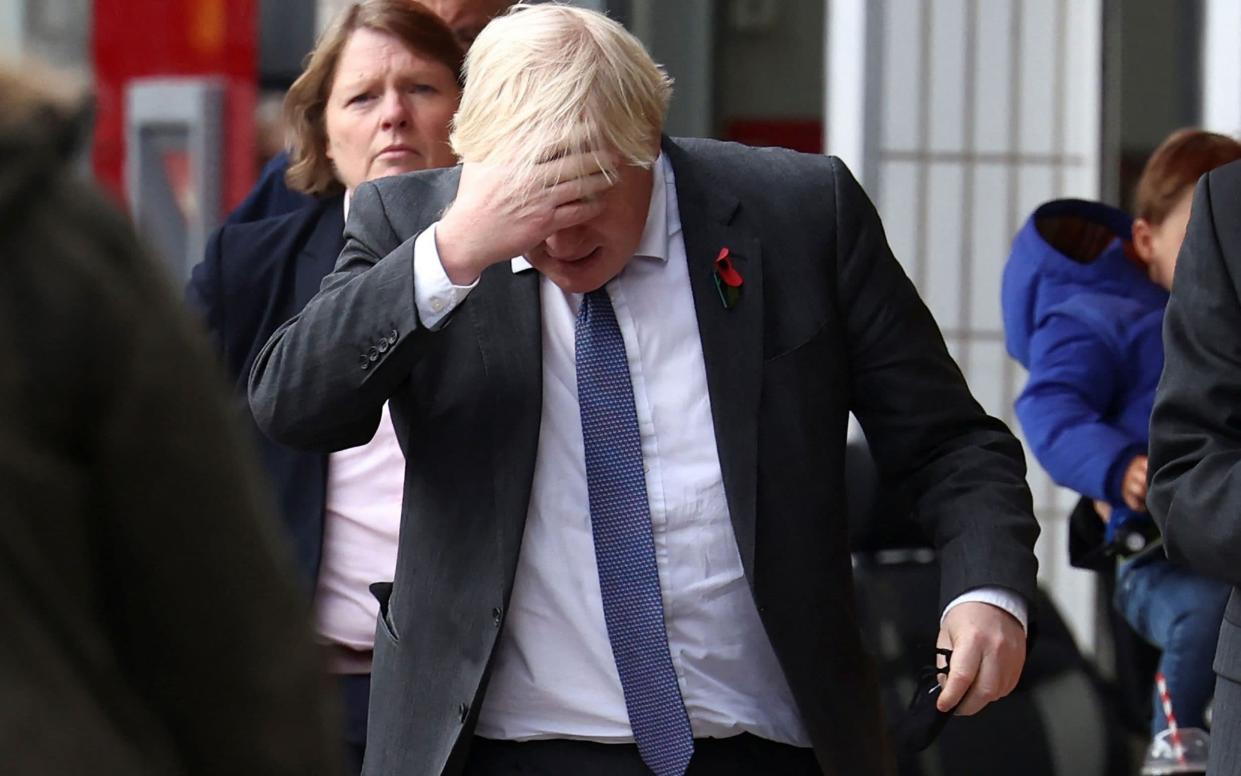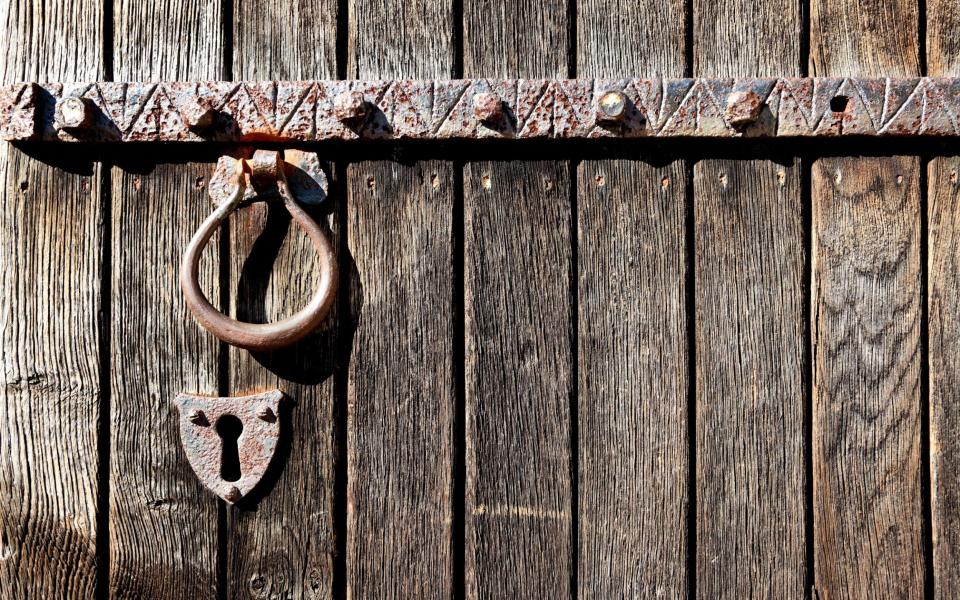Letters: The Conservative Party has become unrecognisable to its core voters

SIR – Higher taxes, irresponsible spending, the Blob given free rein, cancel culture allowed to run virtually unchecked, militant unions playing fast and loose, and a maniacal focus on all things green, which will plunge much of the country into penury: no one who voted Conservative voted for any of this.
I won’t vote again until Britain has a political party that is Conservative in reality, not just in name.
Philip J Ashe
Leeds, West Yorkshire
SIR – I joined the Conservative Party during the tenure of the hapless Theresa May, and voted for Boris Johnson to get Brexit done.
When he won his majority in the general election, I rejoiced at the possibilities for reform now that we were out of the EU. How gullible I was.
In recent months I have been on the verge of cancelling my membership many times as I have watched Mr Johnson dither and jest. The EU clings to Northern Ireland as if part of its territory instead of ours, and in the Commons last week the Opposition was presented with an open goal into which it lobbed allegations of sleaze.
Perhaps worst of all, the Prime Minister is ever more in thrall to policies that will impoverish millions, though not him or his friends. They will strip us of our competitiveness in an increasingly hostile world.
So I am continuing my membership to do all I can to keep a Conservative government in office, but to rid it at the first opportunity of Mr Johnson. He should stick to writing books about Churchill rather than deluding himself that he can emulate him.
Major Nigel Price (retd)
Wilmslow, Cheshire
SIR – Sir John Major’s criticism of the Government’s conduct in the Owen Paterson affair as “shameful, wrong and unworthy” was characteristically ill-considered.
Sir John spent three years trying to reverse the Brexit vote, and when he was in power his policies undermined his predecessor’s reforms to rebuild the economy. He has no moral authority to make such judgments.
His rancour reminds me of Edward Heath’s hostility towards Margaret Thatcher.
David Saunders
Sidmouth, Devon
SIR – The Prime Minister likes to make reference to the ancient world, and a few weeks ago was quoting Sophocles’s Antigone to the UN.
In the play, the newly appointed king Creon makes grand speeches about respecting law and order but then reveals himself to be a despotic ruler. The audience lose sympathy for him because of his high moral tone and willingness to condemn others.
At the end of the play, he has an epiphany as he realises – too late, alas – that he has lost his sophrosyne, his sense of judgment. Wisdom and humility have deserted him, and so too have the citizens of Thebes.
David Huggon
Wivenhoe, Essex
The Mosley taint
SIR – I graduated from University College London back in the 1950s, and in later life was chair of the council for 10 years until 2005.
Before and during that time I played a part in fundraising, and we were always sensitive to the source of the money. I knew of the pre-war marches of the Blackshirts and experienced some of the post-war antics of Oswald Mosley, ably supported by his son Max, and the thought that a donation from that family could ever be acceptable would never have occurred to us.
Since those years, anti-Semitism – often in the guise of anti-Israel demonstrations – has become apparent on many a university campus and hardly needs the encouragement that the naming of any building after the Mosleys would provide.
Lord Young of Graffham
London SW1
Vaccine inconsistency
SIR – The Government’s insistence that non-NHS care staff are fully vaccinated makes no sense whatsoever.
Of course they have had ample time to be vaccinated, but so have NHS frontline staff, and they are being given a dispensation until the end of March 2022. I suspect the Government is fearful of confronting NHS unions but knows it can get away with bullying the largely non-unionised workers in the private sector. The added bonus for the Government is that workers who lose their private-sector jobs could be welcomed into the NHS.
With the loss of so many staff from the private sector, it will be interesting to see how the Care Quality Commission deals with the resulting failure of care homes to maintain its minimum staffing regulations.
Alan Quinton
Eastbourne, East Sussex
John Lewis homes
SIR – Your recent article (“John Lewis suffers setback to property plans after villagers object to affordable homes”, Business, November 7) claimed that we have “plans to build a dozen affordable homes” in Leckford. As you have now acknowledged, that is incorrect. We proposed to sell land so English Rural could develop affordable housing.
Your accompanying article links Leckford with our broader property rental ambitions. These are entirely separate. Proposals to sell a small piece of land in Leckford have no bearing on our nationwide ambitions to build 10,000 homes over the next decade.
Chris Harris
Director of Property, John Lewis Partnership
London SW1
In praise of the plough
SIR – As a farmer who still uses the plough, I would like to add to Charlie Flindt’s remarks (Letters, November 7).
The demise of the plough in many arable areas is not predominantly due to increasing environmental awareness, but rather the fact that farms have become much larger. Given the need to take advantage of shortening windows between harvesting and planting the following crop, it is simply not possible to plough all the land in a timely manner.
The ability to incorporate farmyard manure and other organic matter at root depth is one major advantage of the plough, as is the avoidance of the soil compaction caused by field operations. During the excessively wet autumn of 2019 it was noticeable how many ploughs were retrieved, or even purchased, in order to make progress.
Hugh Wroth
Marlborough, Wiltshire
EU science funding
SIR – We find the suggestion that the Government is considering withdrawing from the European Union and European Commission’s scientific funding programmes deeply troubling (report, November 7).
These multibillion-pound frameworks have been a core part of British research and development infrastructure for many years, and continue to play a leading role in efforts to understand and overcome the greatest challenges that our planet faces. That Britain is a net financial beneficiary from all of these programmes only underlines their importance to our national prosperity.
Set against a backdrop of a deepening climate crisis and the worst pandemic in a century, now is the time to be strengthening our scientific links with our European neighbours, not severing them.
Dr Benjamin Fernando
University of Oxford
Dr Gordon Brown
British Prime Minister, 2007-10
Professor Lord Martin Rees
University of Cambridge
Dr Louise Upton
University of Oxford
Sir David Baulcombe
University of Cambridge
Professor Douglas Ross
University of Southampton
Professor Ilaria Bellantuono
University of Sheffiel
Dr Michael Head
University of Southampton
Professor Richard Dawson
Newcastle University
Cllr Dr Aysha Raza
Dr Michael Cassidy
University of Oxford
Professor Dragan Savic
University of Exeter
Dr Adam Thompson
Scientists for Labour
Professor Arttu Rajantie
Imperial College London
Professor Andrew Large
Newcastle University
Stephanie Davey
Martin Whitfield
Dr Robert Massey
Nick Walker
eOsphere Limited
James Bezer
University of Oxford
Professor J Benjamin C Whitaker
University of Leeds
Emily Thomas
University of Oxford
Dr Judith Skiming
Slimmed-down Lords
SIR – There are far too many seats in the House of Lords.
May I suggest a new type of ennoblement – that of a non-sitting lord? These individuals would still be recognised for their contribution to society but would not be entitled to participate in the legislative process, nor sit in the Upper House. Their recognition would be the equivalent of a knighthood, albeit under a different name. This should prove no more controversial than the distinction between hereditary and life peers.
The number of sitting lords should not rise until it has fallen to perhaps 650. It should then be closely managed in an apolitical way.
Roger Fowler
Shefford, Bedfordshire
Surname saga
SIR – I always have to correct the spelling of my surname (Letters, November 7).
Counter staff have asked me if I am sure there is no “h”. I spell it out where required and watch as the “h” is inserted. I query this, and the reply is that it doesn’t matter. Old friends still misspell my name on Christmas cards.
Fergus Nicolson
Gowdall, East Yorkshire
It’s not just Christians who care about churches

SIR – Many folk must share Sir Michael Palin’s feelings about Britain’s wonderful parish churches.
Agnostics, atheists and non-churchgoing Christians can all contribute to the upkeep of these ancient focal points of our cities, towns and villages by becoming a “friend”. Many churches have friends organisations whose fundraising efforts help keep the buildings in good order, or provide the extras that church governing councils can’t afford. Umbrella friends organisations, meanwhile, give grants for essential repairs and alterations.
How awful our townscapes and landscapes would look if parish churches were allowed to disappear.
Colin Senneck
Secretary, Friends of All Saints Church
Hartley, Kent
SIR – Sir Michael Palin raises the issue of church funding.
There are many couples who would like to marry in a church but do not qualify. Maybe churches could establish themselves as wedding venues for civil ceremonies, thus tapping in to a very lucrative industry. The events might even help generate new “customers” for the church’s spiritual activities.
Barrie Bain
Wadhurst, East Sussex
SIR – In its 27 years of helping churchwardens and parishioners with their problems, Save Our Parsonages has spent most of its time mediating between the parishes and the dioceses.
The discontent in the parishes has arisen from three factors: first, the erosion of their resources and their ability to function in an unfettered way; secondly, the failure to consult them when decisions are taken that adversely affect them; and, thirdly, the constant burden of diocesan costs they are expected to bear even though the assets they once had have been expropriated.
Reversing these policies would have immediate benefits. The parishes are competent to look after their own affairs if only they are given the ability to do so.
Anthony Jennings
Former director, Save Our Parsonages
London WC1
Why television ‘news’ is nothing of the sort
SIR – Janet Daley is right about the partial television news coverage of Cop26.
I recommend that she joins those of us who no longer watch any broadcast news at all, and are better informed for it. For many years now, this form of news has simply been a mouthpiece for the media and chattering classes.
I would also recommend avoiding the BBC – with its humourless, woke pontificating – altogether.
Phil Coutie
Exeter, Devon

 Yahoo News
Yahoo News 
